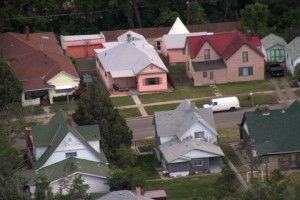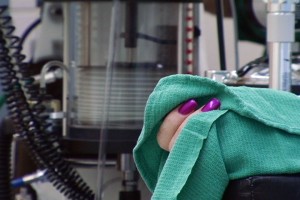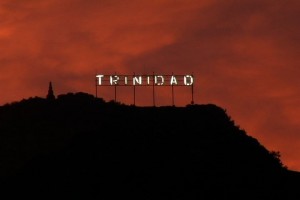The Story
SHORT SYNOPSIS…
 Trinidad uncovers Trinidad, Colorado’s transformation from Wild West outpost to “sex-change capital of the world,” and follows three transgender women who may steer the rural ranching town toward becoming the “transsexual mecca.”
Trinidad uncovers Trinidad, Colorado’s transformation from Wild West outpost to “sex-change capital of the world,” and follows three transgender women who may steer the rural ranching town toward becoming the “transsexual mecca.”
LONG SYNOPSIS…
 For the 9,000 residents of the quiet, rural town Trinidad, Colorado, “sex change capital of the world” is just another way of saying “home.” Located on the Santa Fe Trail, where the Rockies fade into the Great Plains, this one-time mafia-run, coal mining town is an unlikely destination for more than 6,500 transsexuals who have gone there to align their bodies with their minds.
For the 9,000 residents of the quiet, rural town Trinidad, Colorado, “sex change capital of the world” is just another way of saying “home.” Located on the Santa Fe Trail, where the Rockies fade into the Great Plains, this one-time mafia-run, coal mining town is an unlikely destination for more than 6,500 transsexuals who have gone there to align their bodies with their minds.
In 2003, Dr. Marci Bowers left her family and thriving OB/GYN practice in Seattle to take over Dr. Stanley Biber’s genital reassignment surgery (GRS) practice in Trinidad. In 1969, years before the practice had been established in more cosmopolitan cities, Dr. Biber performed Trinidad’s first GRS. With no training in the surgery, he referred to another surgeon’s drawings for instruction, a testament to the confidence of his pioneering spirit. With an increasing number of patients awaiting GRS, Dr. Biber couldn’t keep the surgeries a secret for long in the Catholic-run hospital.
At eighty years of age, with over 5,800 sex-change operations under his belt, Biber turned his practice over to Marci. Formerly Mark, Marci is the first transgender surgeon to perform GRSs. Having refined her GRS method so that it is roughly 85 percent different from Dr. Biber’s, and because of the innovations and empathy she brings to patients from having undergone the surgery herself, Marci is considered by many to be the best GRS surgeon in the world, a claim supported by her yearlong waiting list and the patient testimonies as she makes her rounds in the hospital.
With Marci’s encouragement, two of her patients, Sabrina Marcus, an engineer and founder of the Southern Comfort Transgender Conference, and Dr. Laura Ellis, a family practitioner, begin renovating a Victorian house to turn it into a recovery bed-and-breakfast for post-operative transgender patients. For Sabrina it is a chance to rebound after being fired from NASA when she began transitioning. For Laura it is a chance to fully transition to female in a place she refers to as the “transgender spiritual center.” This pocket of transgender residents—a unique addition to the town—has hopes of fostering a community at Morning Glow, where “guests can become the person they want to be with people who have been through similar experiences.” They plan to have renovations complete and the house occupant ready within six months.
All three women’s personal histories are brought to life with snapshots from their childhoods (when the first feelings of being in the wrong body emerged), of adolescence and college years (when they suppressed these feelings), of first girlfriends, wives, family trips, birthdays, and the period when they began transitioning and outwardly straddling both genders. Verité footage of their everyday experiences reveals even more about the women: how they fill their lives communicates their values (community, friendship, faith, family, solitude); the way they carry themselves hints at levels of comfort and self-confidence; and their interactions among themselves and with others suggest their varying tempers and dispositions. Additionally, Laura’s and Sabrina’s relationships with their children and the information their children disclose in interviews helps flesh out these women’s characters.
 Six months into the renovation and Morning Glow is still not ready to accommodate guests, and finances are running low. While Laura focuses on her medical practice and Sabrina finds a job at the hospital, JoAnne, also a transwoman, has become the sole worker on the house, labor she gladly exchanges for room and board. Having lived out of her car while driving across country searching for a place where she could fit in, JoAnne considers Morning Glow a safe haven, suggesting to the proprietors’ that their efforts are already paying off.
Six months into the renovation and Morning Glow is still not ready to accommodate guests, and finances are running low. While Laura focuses on her medical practice and Sabrina finds a job at the hospital, JoAnne, also a transwoman, has become the sole worker on the house, labor she gladly exchanges for room and board. Having lived out of her car while driving across country searching for a place where she could fit in, JoAnne considers Morning Glow a safe haven, suggesting to the proprietors’ that their efforts are already paying off.
Though numerous transsexual women pass through Trinidad, few of them remain. Generally native Trinidadians are accustomed to transient patients as a part of the town’s landscape, resulting in a community that is more versed in the aspects of gender identity than most places its size. Whether they agree or disagree with the surgeries, Trinidad residents have definitely contemplated gender, as is evident in various sequences in the film: A chorus of townspeople share their “sightings” and interactions with patients. A second group brings its theoretical and theological viewpoints to the dialogue. A group of children explore the stereotypes of what it means to be a man and a woman, sometimes surprisingly blurring well-established gender lines. While there are detractors, overall the town accepts the practice.
This “to each their own” attitude was recently challenged when the local daily published an editorial written by a preacher calling for a coalition of churches to end the GRS surgeries. This appeal, coupled with the recent death of Dr. Biber, caused Marci to question the security of her practice. “[It] let the town have its say on something that had been done here for thirty-five years. Well now that Dr. Biber’s gone maybe it [the GRS practice] will just end.” The townspeople really had a chance to express their opinions, and they did to great effect. Letters supporting Marci’s practice, including one from Father Bob Hagan, pastor of Trinidad’s Holy Trinity Parish, poured in: “Leave the judging to God,” “Reject hate, intolerance,” “Town should stay open, accepting.”
Though the location seems ideal for Morning Glow, the women cannot seem to get the business off the ground. A year into the project, and Laura has grown increasingly frustrated with the slow progress of the renovation (which she has financed). Though Marci and Sabrina have integrated fully into the town, Laura feels out of place. Having fully transitioned in Trinidad in the short time she has been there, she is still learning how to become “Laura,” a task she’s finding increasingly difficult amid other challenges she faces. In an attempt to get on with her life, she looks for work elsewhere, finally landing a position in a small Alabama city, where residents may not be as accepting as those of Trinidad. Disappointed that she’s left to manage the renovation and eventually run Morning Glow on her own, Sabrina is determined to persevere while continuing with her full-time job at the hospital. The warmth with which she welcomes her first guest suggests she might succeed.
 On an intimate level, the film follows three women with a shared struggle but conflicting personalities: Marci, who steadily grows her GRS practice and pushes for Morning Glow’s completion but offers no professional or financial support; Sabrina, who takes on a more active role at Morning Glow than she had expected, while increasingly becoming a part of the town’s social fabric; and Laura, who after several attempts to foster a sense of community, becomes increasingly disillusioned and isolates herself from the others as she plans her move.
On an intimate level, the film follows three women with a shared struggle but conflicting personalities: Marci, who steadily grows her GRS practice and pushes for Morning Glow’s completion but offers no professional or financial support; Sabrina, who takes on a more active role at Morning Glow than she had expected, while increasingly becoming a part of the town’s social fabric; and Laura, who after several attempts to foster a sense of community, becomes increasingly disillusioned and isolates herself from the others as she plans her move.
More generally, Trinidad explores the growing popularity of the town among the transgender community; the intersection of the recently formed transgender community with long-term residents; how the death of much-revered Dr. Biber may influence the town’s acceptance of the GRS practice; and where gender dysphoria fits in terms of God’s creation.
Part observational film and part essay, Trinidad explores the diverse characters and personal histories of a group of people who have come together because of similar life experiences. To create intimacy visually among the audience and characters, we relied primarily on natural lighting and shot digital video to allow for a smaller crew and larger shooting ratio, frequently in cinema verité–style. This method enabled us to be as least invasive as possible while allowing stories and conversations to unfold through the activities of the characters’ daily lives, such as during meals, at work, and in activities in the community and with their families. Viewers will get a real sense of life in Trinidad and its GRS history as well as a look into the past and present of our characters’ lives and their individual passions, concerns, and struggles as told through their own voices.




